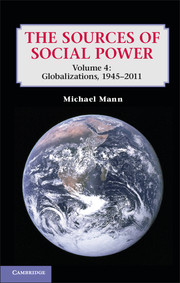Book contents
- Frontmatter
- Contents
- 1 Globalizations
- 2 The postwar global order
- 3 America in war and cold war, 1945–1970
- 4 U.S. civil rights and identity struggles
- 5 American empire during the cold war, 1945–1980
- 6 Neoliberalism, rise and faltering, 1970–2000
- 7 The fall of the Soviet alternative
- 8 The Maoist alternative reformed
- 9 A theory of revolution
- 10 American empire at the turn of the twenty-first century
- 11 Global crisis
- 12 Global crisis
- 13 Conclusion
- Bibliography
- Index
3 - America in war and cold war, 1945–1970
Class conflicts
Published online by Cambridge University Press: 05 January 2013
- Frontmatter
- Contents
- 1 Globalizations
- 2 The postwar global order
- 3 America in war and cold war, 1945–1970
- 4 U.S. civil rights and identity struggles
- 5 American empire during the cold war, 1945–1980
- 6 Neoliberalism, rise and faltering, 1970–2000
- 7 The fall of the Soviet alternative
- 8 The Maoist alternative reformed
- 9 A theory of revolution
- 10 American empire at the turn of the twenty-first century
- 11 Global crisis
- 12 Global crisis
- 13 Conclusion
- Bibliography
- Index
Summary
Since the United States was the leading superpower, its domestic economy and politics became of great significance for the world. Since my general method in these volumes is to focus on the “leading edge” of power in any period, I give most attention now to the United States. In the postwar period, compared to other Western countries, the United States became much more conservative at home in terms of class politics, while becoming more liberal in terms of protecting personal identities. Neither process was steady or continuous. Class politics were closely contested both in the immediate postwar period and in the 1960s, after which conservatism racheted upward. But identity liberalism tended to surge later. In this chapter I will take both stories up to about 1970.
The impact of World War II
To explain postwar developments we must start during the war. The United States did not declare war until the end of 1941 and for two full years before then had profited from selling war material to Britain and mobilizing for a possible war amid a recovering economy. There was military-led growth. Unused industrial capacity and unexploited technological improvements were brought onstream, aided by an increased labor supply (especially women), a decline in low-productivity sectors, and a modest increase in hours worked. Manufacturing production continued to rise as the United States fought across the Pacific and Europe. The share of military expenses in gross national product (GNP) rose from 1.4 percent in 1939 to an astonishing 45 percent in 1944, shattering conceptions of fiscal rectitude. Neither balancing the books nor encouraging private investment mattered anymore. Since the United States was receiving the world’s gold to pay for supplies sent to its allies, it could also run large deficits without adverse monetary effects. Real GNP rose a phenomenal 55 percent during 1939–44, due to an across-the-board mobilization of resources (Rockoff, 1998: 82). Economically, it was a very good war for Americans. For everyone else it was bad. The difference meant the United States dominated the world economy afterward.
- Type
- Chapter
- Information
- The Sources of Social Power , pp. 37 - 66Publisher: Cambridge University PressPrint publication year: 2012



